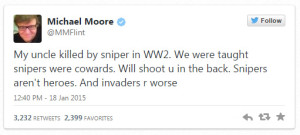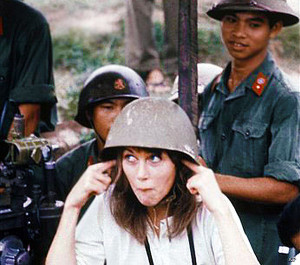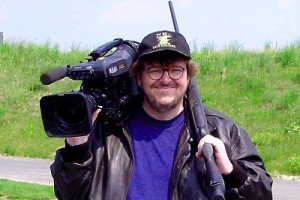David Preston: Special to The Ave
Responding to last week’s blockbuster opening of American Sniper, documentarian and social critic Michael Moore suggested that the biopic’s subject, Navy SEAL Chris Kyle, was no hero. As support for this, Moore tweeted that his own uncle had been killed by a sniper and that he was brought up believing that snipers were cowardly fighters.  Moore has not produced evidence for the claim that his uncle was killed by a sniper, but that’s beside the point. What matters is how Moore (and the people he grew up with) could have believed snipers to be cowards. In fact snipers, like spies and assassins, have traditionally been seen as a lower order of fighter than soldiers who engage their enemy in open battle. Especially when they’re working for the other side. Unlike other combat soldiers, a sniper kills in cold blood and, when it is convenient, may even shoot people in the back. Meanwhile, it would seem that the sniper is at less risk than other soldiers, since he fights from a position of concealment. Due to the nature of their job, snipers are usually not found in the most forward battle positions, and they are thus less exposed to the immediate hazards of battle. A sniper is certainly less likely to get killed in hand-to-hand combat than an ordinary infantryman. Against this, however, we must weigh the fact that a sniper is, for obvious reasons, a high-value target himself. If a sniper’s presence is detected, the enemy will spare no effort to locate and remove him, possibly with the aid of another sniper. Thus, while a sniper’s job may seem safer at first flush, to the extent he does his job well, he may soon find himself with a target on his own back. Snipers themselves are surely aware of this, and it must give them pause. .
Moore has not produced evidence for the claim that his uncle was killed by a sniper, but that’s beside the point. What matters is how Moore (and the people he grew up with) could have believed snipers to be cowards. In fact snipers, like spies and assassins, have traditionally been seen as a lower order of fighter than soldiers who engage their enemy in open battle. Especially when they’re working for the other side. Unlike other combat soldiers, a sniper kills in cold blood and, when it is convenient, may even shoot people in the back. Meanwhile, it would seem that the sniper is at less risk than other soldiers, since he fights from a position of concealment. Due to the nature of their job, snipers are usually not found in the most forward battle positions, and they are thus less exposed to the immediate hazards of battle. A sniper is certainly less likely to get killed in hand-to-hand combat than an ordinary infantryman. Against this, however, we must weigh the fact that a sniper is, for obvious reasons, a high-value target himself. If a sniper’s presence is detected, the enemy will spare no effort to locate and remove him, possibly with the aid of another sniper. Thus, while a sniper’s job may seem safer at first flush, to the extent he does his job well, he may soon find himself with a target on his own back. Snipers themselves are surely aware of this, and it must give them pause. .
. Moreover, just because a sniper lies concealed does not mean he is unexposed to risk. To be maximally effective, he must sometimes approach the enemy from behind, thus surrounding himself with hostile troops and isolating himself from the protection of friendly ones. A notable case of this happening was the battle of Stalingrad, where both German and Soviet snipers were often required to operate behind enemy lines. In that battle, captured snipers were executed immediately; they were not taken prisoner. Add to this the fact that snipers, just by their presence on (or near) a battlefield, are exposing themselves to a risk of death that is several hundreds of times greater than the risk incurred by a civilian on the other side of the world. A civilian like Michael Moore, for example. Thus “coward” is not usually the word that comes to mind when we think of anyone who volunteered for combat duty in Iraq, as Mr. Kyle did. There is no doubt that American forces enjoyed tremendous advantage in firepower and logistics over Iraqi insurgents, and one could argue that, from the American side, the war itself was a cowardly affair, and that snipers, with their long-range scopes and high kill ratios, gave the American “invaders” yet another “cowardly” advantage over the insurgency’s underequipped fighters. There are problems with that logic, though. First, it must be remembered that the Iraqi fighters had several battlefield advantages of their own. As is typical for guerrilla fighters, they knew the terrain better and could generally use both it and their ties with the local population to their advantage, even when they were outmatched tactically. It’s not as if the insurgents in Iraq were sitting ducks, waiting to be picked off by the Americans. In battle, they were a respected adversary, an opponent who gave as good as they got. American ground troops knew this, and that’s why they appreciated anything a sniper could do to reduce the number of enemy soldiers firing at them . . . even if that meant picking off an enemy fighter from a thousand yards, or shooting him when he was sitting on the crapper, or kneeling on his prayer rug. .
. Battlefield victories aside, the U.S. did not win the war in Iraq. Nobody did, actually, unless by “winning” you mean smashing a country into little bits, each with edges sharp enough to kill. Like Vietnam, the Iraq experience has not been a good one for America. Still it’s easy to understand why Chris Kyle is a hit right now, and why Mr. Moore is not. Now that the Iraq war’s finally lost (sort of) Americans need some assurance that we were, after all, at least trying to fight the good fight, and that our guys were bona fide heroes. In short, we needed another Green Berets, with a new John Wayne. American Sniper was that movie, complete with new sets, a new cast, and new special effects. The role of John Wayne is played by Bradley Cooper.
.


Sniping is just another military tactic. Snipers employ aimed fire, often from long range, to disrupt enemy movements and pin down enemy soldiers. It’s no more or less moral than any other killing in war. In Vietnam, Army and Marine snipers operated in “long range patrols” deep inside enemy territory, which made their job far more dangerous than routine infantry patrols. Snipers are, as you said, high-value targets; in Vietnam, we’d call in artillery and airstrikes on enemy snipers and take out a whole tree line if necessary to get them. Michael Moore is reacting emotionally to his uncle’s death, which is understandable, but he doesn’t know what he’s talking about. From my perspective as a Vietnam veteran, I think it’s inappropriate to use the words “coward” or “cowardly” to describe any soldier doing his job in a war zone. In war, a “coward” is a soldier who runs away from his post and leaves his buddies in the lurch, or someone who commits atrocities against helpless civilians. The right or wrong of a given war is a separate issue; an unjust war is the responsibility of the government that initiates it, not the soldiers who fight it — they have no choice in the matter. Anti-war protests should be directed at governments, not the troops or veterans.
I am on the same side as Roger and David. This phony issue illustrates the gap created by hate mongers on the right and the left. Lace curtain liberals, usually white folks who are fairly well off, moralize all the time about wae .. as if it were some sort of game and our team must be the good guys. Somehow drones, snipers , bombers are unfair because the other side does not have a fair chance.
Meanwhile the Faux patriots need to cloak our soldiers in the robes of crusaders … as if they were as noble as Tom Brady or John Wayne.